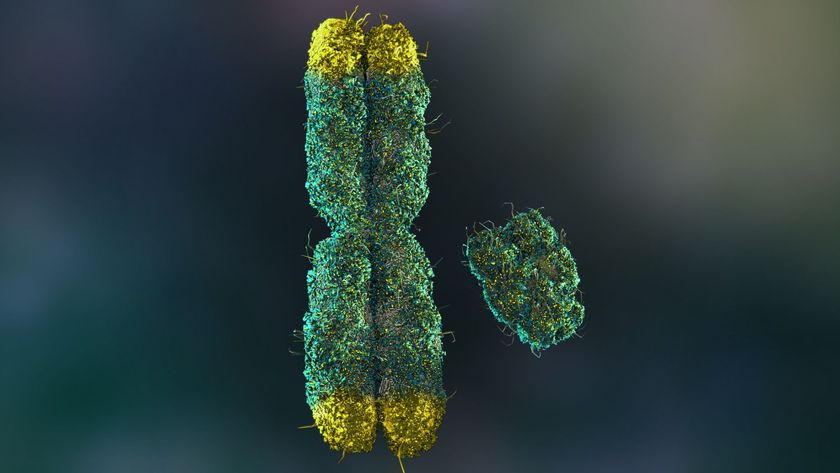Love Drug? Oxytocin's Tender Effects Questioned

With Valentine's Day just around the corner, love is in the air. Or is it oxytocin? This so-called "love hormone" is involved in social bonding, and it always seems to get a publicity boost around Feb. 14. But research suggests that oxytocin isn't all roses and heart-shaped chocolates.
Oxytocin is marketed as an all-purpose "love drug" year-round. Online, sellers shill a product called "liquid trust" that purports to contain oxytocin and promises to create an "environment within which you are more attractive to people you previously had no luck with." In San Antonio, Texas, at least one doctor prescribes dissolvable oxytocin strips for husbands and wives going through rough patches, according to a Feb. 10 news report by local news station KENS5.
Even cultural and political commentators have touted oxytocin's effects, arguing that the hormone makes no-strings-attached sex impossible, especially for women.
"The way chemicals are released in the brain during intercourse is very different in men and women," Washington Post reporter Laura Sessions Stepp, the author of "Unhooked: How Young Women Pursue Sex, Delay Love and Lose at Both" (Riverhead Books, 2007), told Marie Claire magazine in 2007. "In women, oxytocin is released. It's a chemical that makes women want to nurture their young and stay close. Men get a huge jolt of testosterone, which suppresses oxytocin, and that's nature's way of saying, 'Leave the nest and go sire offspring somewhere else.' So when women think they can have sex and walk away just like guys do, they're having to suppress thousands of years of evolution that tells them to cuddle."
Not so fast. Sex may foster closeness, researchers say, but oxytocin shouldn't be blamed for bonding you forever to that guy you met at the bar last night. And the hormone isn't exactly going to make you a top salesman or irresistible lover. In fact, oxytocin is a complex chemical with a variety of influences on social behavior. It can increase trust among strangers — but it can also intensify negative memories of an aloof mother and even make you favor your "in-group" over people you perceive as outsiders.
"Oxytocin is not this indiscriminate love drug," Carsten K.W. de Dreu, a psychologist at the University of Amsterdam, told LiveScience.
Vole love
Sign up for the Live Science daily newsletter now
Get the world’s most fascinating discoveries delivered straight to your inbox.
Oxytocin's role in social bonding was first discovered in the prairie vole, a Midwestern rodent that mates for life. The animal's rare monogamy traces back to oxytocin receptors embedded deep in the pleasure center of its brain. The hormone is released during sex, and the resulting bliss seems to forge a bond between male and female. Montane voles, a prairie vole cousin, don't share this brain circuitry or the prairie vole's monogamous lifestyle. Even injections of straight oxytocin can't stop montane voles from bed-hopping.
Studies on humans have found that, like voles, our oxytocin receptors are situated in pleasure areas of the brain. Oxytocin is released during childbirth and breastfeeding, as well as during sex and hugs with loved ones. Even playing with your dog can boost oxytocin levels, especially if you make eye contact with the pooch, according to a 2009 study published in the journal Hormones and Behavior.
All of these studies have cemented oxytocin's place as a bonding hormone. But the story isn't straightforward – even in voles. A 2008 study published in the journal Animal Behavior found that prairie voles actually cheat on their partners frequently. The animals stay socially bonded to one partner, but often seek out something purely sexual on the side, the researchers concluded.
"Somewhat ironically," the researchers wrote, "this distinction between prairie voles and other monogamous rodents, the dissociation of social and sexual ?delity, leads us to suggest that prairie voles are even better models of human attachment than has been appreciated." [Read Young Adults and Monogamy: It's Complicated]
Conditional trust
The cheating prairie vole story isn't the only place where the oxytocin-as-love-panacea narrative falls apart. Paul Zak, a neuroeconomist at Claremont Graduate University in California, has carried out a series of studies on oxytocin and generosity. He's found that a dose of oxytocin can increase generosity – but only if the giver has to consider the emotions of the receiver.
In a study published in 2007 in the open-access science journal PLoS One, Zak and his colleagues gave 68 men a dose of either oxytocin or inert saline solution via a nasal spray. They then gave the men $10 and told them to give any amount they wanted to another partner. In some cases, the partner had to accept the money given. In others, he could reject the amount as too miserly. If that happened, both partners would walk away without any cash.
Oxytocin didn't change the volunteers' generosity when they didn't have to think about whether their partner would reject their offering. But when they had to consider the other person's feelings, oxytocin made them more generous, and they gave 80 percent more than those who hadn't taken the oxytocin hit.
"It increases generosity when we are emotionally engaged with the other person," Zak told LiveScience. "When we aren't engaged, we don't see the effect."
Other studies have shown similar conditional effects, Zak said. Oxytocin tends to make people more trusting of strangers, he said. But if you give someone oxytocin and then describe a stranger as having an unreliable personality, the trust effect disappears.
"The system is not deterministic," Zak said.
Intense memories and in-groups
In some cases, oxytocin may simply intensify the social environment that's already there. Jennifer Bartz, a professor of psychiatry at the Mount Sinai School of Medicine in New York, asked male volunteers to fill out questionnaires about their mothers. Next, she dosed some of the men with oxytocin and asked them to rate their mothers' levels of care and closeness.
Oxytocin did have an effect on the men's recollection of these social memories, Bartz and her colleagues reported online in the journal Proceedings of the National Academy of Sciences (PNAS) in November 2010. But the effect differed depending on how the men had initially described their moms. Those who were securely attached to their mothers described them more fondly after the oxytocin boost. But those who had troubled relationships described their mothers as less caring after taking oxytocin.
"We would still suggest that it is a bonding hormone involved in attachment," Bartz said of oxytocin. "But what we found is that the story wasn't so simple."
Rather than being a feel-good hormone, oxytocin may help in the formation of social memories, Bartz said. These memories tell us what to expect from a relationship. Activating the system with a whiff of oxytocin could intensify these memories, for better of for worse.
Another recent study revealed a similar dark side to oxytocin: In addition to being the hormone of bonding, it may be the hormone of ethnocentrism. In a study published in January 2011 in the journal PNAS, the University of Amsterdam's de Dreu asked Dutch students about their attitudes toward outside groups. He found that oxytocin increased loyalty to fictional characters with Dutch names, but didn't increase warm-and-fuzzy feelings for people with Arab or German names.
"People come to view their in-group as more positive given oxytocin," de Dreu said.
This doesn't mean that oxytocin makes people racist or chauvinistic, de Dreu said: The understanding of who is "in" and who is "out" is based on cognition and culture, not the hormone. A Dutch soccer rivalry might create two factions in the Netherlands, de Dreu said, but when it comes time to play Spain in the World Cup, the Dutch rally together and the Spanish are the new out-group. Oxytocin strengthens feelings about the in-group, but it doesn't determine who gets grouped as "in" or "out."
The one-night stand hormone?
All of this is not to say that oxytocin isn't involved in love and commitment. Research by Ruth Feldman, a psychologist at Bar-Ilan University in Israel, has shown that higher levels of oxytocin during pregnancy are associated with better bonding after a baby is born. Fathers also get an oxytocin boost when playing with their babies, Feldman said. And pilot data on a large study of new lovers suggests that when people fall in love, oxytocin levels spike.
But when it comes to casual sex, Feldman said, no one has done studies on humans to measure oxytocin and emotional entanglement.
"The findings are not there," Feldman told LiveScience.
Women whose brains release more oxytocin tend to have more sex, Claremont's Zak said, though it's not known whether one causes the other. Sex may deepen feelings, he said, but if hormones alone were to blame, other oxytocin-boosting activities would be causing a lot more trouble.
"If the casual sex story is true, then there should be no back massages, no chick flicks," Zak said. "All those should be out the window."
And what of "liquid trust," now selling at $30 for a quarter-ounce and citing Zak's research as evidence that spraying yourself with an odorless formula can bring success in business and in bed?
"It's totally bunk," Zak said.
You can follow LiveScienceSenior Writer Stephanie Pappas on Twitter @sipappas.

Stephanie Pappas is a contributing writer for Live Science, covering topics ranging from geoscience to archaeology to the human brain and behavior. She was previously a senior writer for Live Science but is now a freelancer based in Denver, Colorado, and regularly contributes to Scientific American and The Monitor, the monthly magazine of the American Psychological Association. Stephanie received a bachelor's degree in psychology from the University of South Carolina and a graduate certificate in science communication from the University of California, Santa Cruz.











